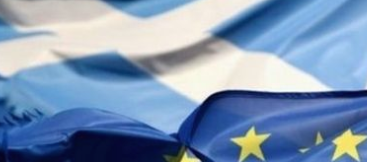The Scottish Government’s Constitution Secretary Angus Robertson said Brexit has limited Scotland’s economic growth, restricted trade, increased food costs and diminished opportunities for young people.
Marking seven years to the day since 62% of people in Scotland voted to remain in the European Union, a Scottish Government paper — called Brexit and Scotland: June 2023 Update — has been published detailing the impact of Brexit, drawing from reports and official statistics.
These include:
- an expected loss of £3 billion every year in public revenues for Scotland
- food price inflation at a 45 year high “with Brexit responsible for an estimated one third of it”
- damaged trade with 44% of businesses in Scotland naming Brexit as the main cause of difficulties trading overseas
- additional estimated costs of up to £600 per consignment for some shellfish exporters as a result of trade barriers
- staff shortages reported by 45% of tourism businesses in the Highland and Islands, as a result of the loss of freedom of movement
- loss of access to supporting funds like the €96 billion Horizon research programme and Common Agriculture Policy
The report said: “The Office for Budget Responsibility expects the UK’s GDP to be 4% lower in the long run because of Brexit.
“That equates to £3 billion in lost public revenues for Scotland, each and every year.
“Research by the Centre for European Reform paints an even gloomier picture, finding that the UK’s GDP was 5.5% lower by the second quarter of 2022 than if Brexit had not occurred.
“It also found that UK investment was 11% lower and trade 7% lower than it would have been without Brexit …
“EU markets are completely closed to some of our key products. Pre-Brexit, Scottish producers sold 20,000 tonnes of seed potatoes to EU customers each year. That trade has now collapsed.
“Forty four per cent of businesses in Scotland facing difficulties trading overseas named Brexit as the main cause.
“Scottish firms trying to export to Europe face significant additional costs and bureaucracy, at a time when their margins are already being squeezed.
“Our prized seafood industry has been hit with an estimated 50% increase in the cost of packaging items sent to the EU, and new Export Health Certificates are costing the salmon sector alone approximately £1.3 million per year …
“Key Brexit promises made to the Scottish fishing industry have been broken. The UK Government’s characterisation of Brexit outcomes has been described by Mike Park of the Scottish White Fish Producers Association as ‘hyperbole’ and ‘spin’.
“Because of the UK Government’s broken Brexit promises, Scotland has effectively lost quota share and has access to fewer fishing opportunities for some species than it had under the EU’s Common Fisheries Policy.
“This includes, for example, North Sea whiting, where the maximum percentage of total EU and UK quota available to the UK is 73.5%, compared to average UK landings of total UK and EU quota from 2015-2019 of 82.7%
“Even where quota has been gained through the TCA, much of it is for species that the Scottish fleet does not generally catch or does not wish to catch, making it of little practical value.
“In the wider seafood sector, some shellfish exporters have estimated that the new barriers to trade with the EU have resulted in additional costs of £500-600 per consignment, making some exports unviable …”
Robertson said: “Seven years after people in Scotland resoundingly rejected Brexit, the Scottish Government has published a paper that lays clear the damage it has inflicted.
“Brexit means Scotland has now left the world’s biggest single market and no longer enjoys freedom of movement, resulting in labour shortages across the NHS, agriculture, and our hospitality sector.
“Consumers and businesses continue to face a cost of living crisis driven by rampant food inflation, while produce rots in the ground, and obstructive trade barriers that are making it harder to import and export goods from the EU.
“Scotland’s rural and research sectors have lost out on hundreds of millions of pounds worth of EU funding, which the UK Government has been unable to match. A generation of young Scots have been deprived of life-changing exchange opportunities to study abroad.
“While we will continue to do all we can to mitigate this damage through our long-standing ties with European neighbours, the fact remains that the only way to meaningfully reverse this damage and restore the benefits Scotland previously enjoyed, is for an independent Scotland to re-join the European Union.”
